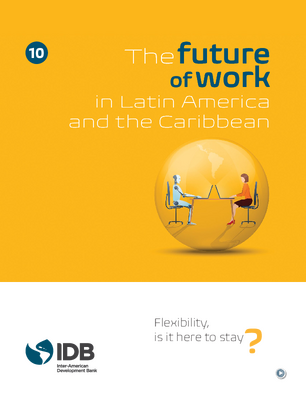The Future of Work in Latin America and the Caribbean : Flexibility, is it Here to Stay?
Date
Oct 2022
The COVID-19 pandemic marked a turning point in the way we work. The work flexibility that first emerged in Europe in the 1990s to facilitate the balance between personal and professional life is now a global trend that workers consider a right and value even more than salary. Latin America and the Caribbean are not exempt from this reality, but work flexibility is experienced differently in a region with high levels of informal employment and regulations that, before the pandemic, were timid, limited in some countries only to telecommuting, and scarcely considered other forms of flexible work arrangements such as the possibility of accumulating working hours (banked hours), working more hours on some days to reduce the workweek (compressed work week), or averaging working hours over periods longer than a week (weekly work cycles).
Currently, with the COVID-19 pandemic as the great catalyst, the vast majority of countries in the region have telecommuting laws, and in several, reforms are being promoted that include other flexible work arrangements. But are the advantages of flexibility homogeneous for all workers and all jobs in the region? What is understood by flexible work arrangements, and how is it changing the dynamics of the labor market in Latin America and the Caribbean? How has the regulation and use of these arrangements evolved worldwide and in our region? And what effect do flexible work arrangements have on the productivity of companies and the well-being of workers in the region? Does it have implications for inequality? In this tenth installment of IDB's series "The Future of Work in Latin America and the Caribbean", we attempt to answer some of these questions while presenting the results of surveys and interviews conducted with companies and workers in 24 countries in the region on the use of work flexibility, its effects on production processes during the pandemic, and its future prospects.
Currently, with the COVID-19 pandemic as the great catalyst, the vast majority of countries in the region have telecommuting laws, and in several, reforms are being promoted that include other flexible work arrangements. But are the advantages of flexibility homogeneous for all workers and all jobs in the region? What is understood by flexible work arrangements, and how is it changing the dynamics of the labor market in Latin America and the Caribbean? How has the regulation and use of these arrangements evolved worldwide and in our region? And what effect do flexible work arrangements have on the productivity of companies and the well-being of workers in the region? Does it have implications for inequality? In this tenth installment of IDB's series "The Future of Work in Latin America and the Caribbean", we attempt to answer some of these questions while presenting the results of surveys and interviews conducted with companies and workers in 24 countries in the region on the use of work flexibility, its effects on production processes during the pandemic, and its future prospects.




